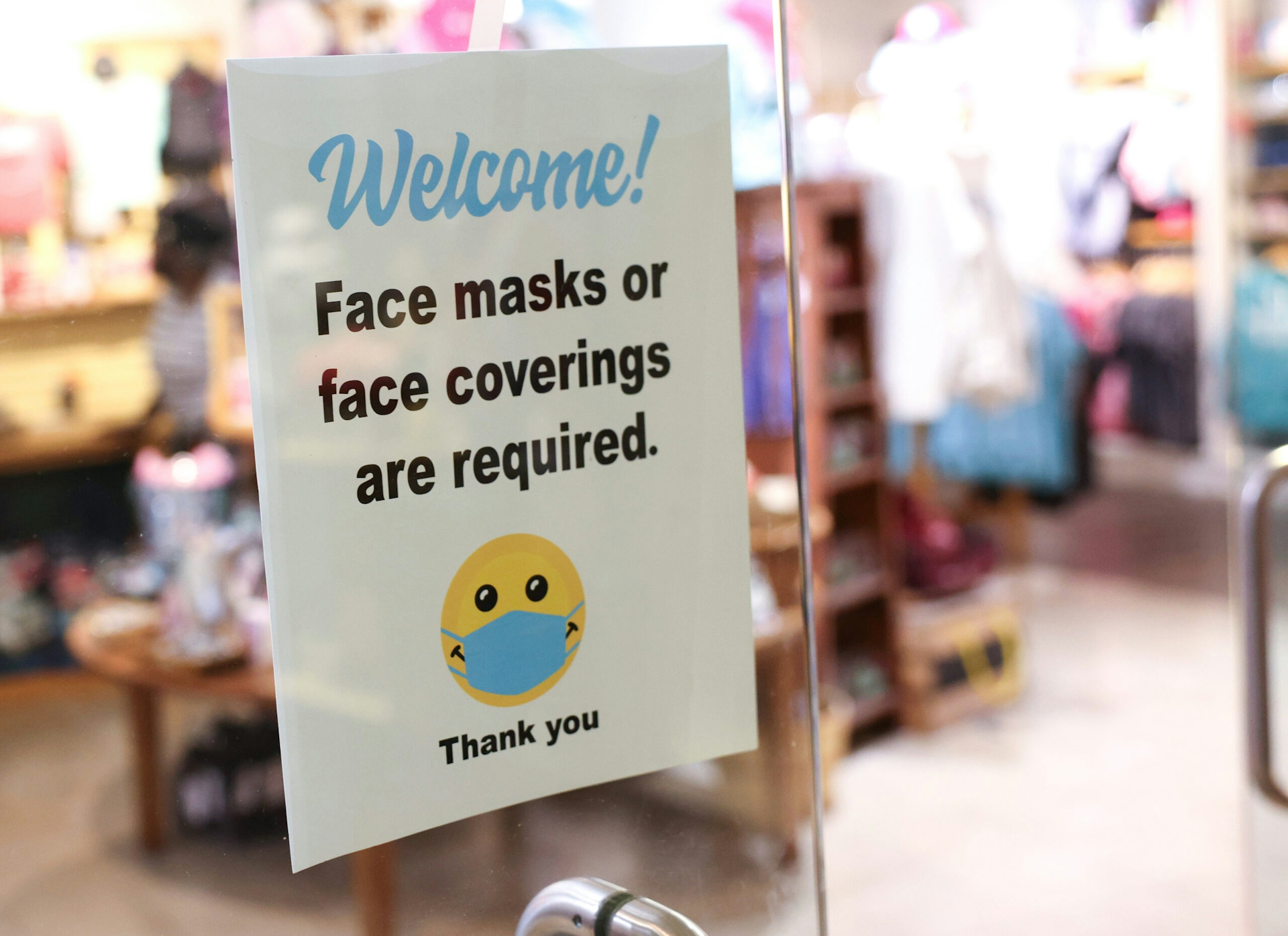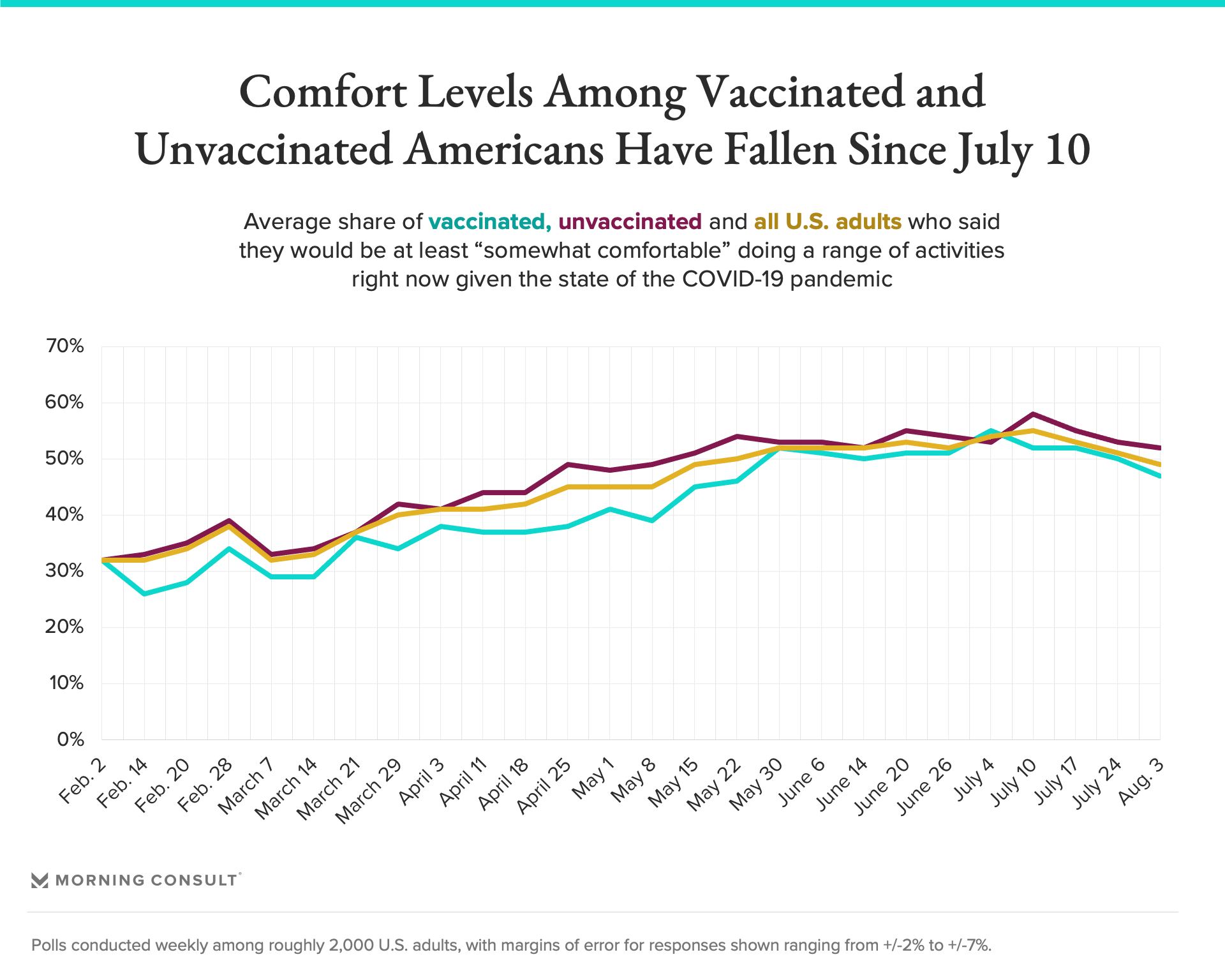Rising Delta Variant Cases, CDC Indoor Mask Guidance Are Taking a Toll on Consumer Comfort Levels

Key Takeaways
47% of vaccinated consumers, on average, said they currently feel safe doing a wide range of activities, a drop from 55% as of July 1-4.
52% of unvaccinated adults said the same, down from 58% since July 10.
Americans are most comfortable dining out at restaurants, with 65% currently saying they feel safe doing that activity.
Comfort with shopping malls is also relatively high at 59%, while comfort with going to movie theaters and sporting events is under 50%.
When the Centers for Disease Control and Prevention announced in May that it was safe for vaccinated Americans to go maskless indoors in most circumstances, comfort levels with leisure activities increased among U.S. adults, especially those who were vaccinated, per Morning Consult’s Return to Normal trend data.
Then, on July 27, the CDC somewhat walked back that decision, recommending that fully vaccinated people should resume wearing masks inside “in areas of substantial or high transmission.” In light of that news, Morning Consult’s reporters decided it was again time to analyze the Return to Normal trackers they update weekly to see where consumer comfort levels across the board stand now.
It’s clear that Americans -- both vaccinated and unvaccinated -- are nowhere near as uncomfortable engaging with leisure activities in public as they were during the height of the pandemic, but responses collected through the trackers after the CDC’s latest guidance show slight dips in comfort levels from the previous week, on average, across more than 40 activities such as shopping at malls, taking vacations and going to sporting events and movie theaters.

This isn’t the first week of declines, however. After remaining mostly flat through 2020, the average comfort level with these activities has generally climbed this year, but the tide started to turn in July.
The average comfort level among all adults reached an all-time high of 55 percent as of a July 8-10 survey, but has ticked down weekly since then, and is now 6 percentage points below that record, at 49 percent. Around that time in mid-July, the CDC sounded alarms about rising COVID-19 cases around the country, especially among the unvaccinated.
Americans' Comfort With Several Activities Drops From July
The average comfort levels among both vaccinated and unvaccinated adults have followed a similar trajectory, although concerns about the delta variant appear to be having more of a negative effect on vaccinated consumers, according to the trend data.
Vaccinated consumers' average comfort level reached a record high of 55 percent as of a July 1-4 survey, but dropped to 47 percent as of early August. The average comfort level among unvaccinated people peaked at 58 percent as of the July 8-10 survey, and is now down to 52 percent.
The new mask guidance seems to be pushing down vaccinated Americans’ comfort levels more as well: Their average comfort level dropped by 3 points from 50 percent in late July to early August, compared to a 1-point dip among the unvaccinated population during that time.
Comfort at Shopping Malls
Some activities, such as shopping at malls, which is second only to dining out at restaurants when it comes to activities people are most comfortable with, experienced slightly larger dips this week. Comfort with malls dropped 5 points from 64 percent to 59 percent.
Restaurants have maintained relatively high levels of consumer comfort through the pandemic, and saw a 3-point decrease from 68 percent to 65 percent this week.
Comfort in Socializing by Generation
Comfort with socializing in public places and going to movie theaters each fell by 4 points. Sarah Shevenock, Morning Consult’s entertainment reporter, pointed out that this week’s data marked a turning point for comfort with theaters, which reached a record high of 55 percent just about a month ago.
“This week was the first significant drop, the first time it’s been below 50 percent since June 14,” Shevenock said. “The obvious connection there is the delta variant, and we’re starting to see the studios react to that as well.”
Comfort With Going to the Movies
Last week, Paramount Pictures pulled “Clifford the Big Red Dog” from its September release date over concerns about rising coronavirus cases, and “this dip in consumer comfort really underscores the fact that that caution is well-placed,” Shevenock said.
Retailers, too, are reacting to these changes. Major companies including Target Corp., McDonald's Corp., Home Depot Inc., Starbucks Corp. and Walmart Inc. all recently announced new pandemic policies, which include mandating vaccines and masks for employees and encouraging mask use by customers.
The sports world has also been affected by rising concerns related to the delta variant, said Morning Consult senior reporter Alex Silverman, with people growing less comfortable with attending sporting events since mid-July.
“There’s been a decline every week since then among all adults and among sports fans,” Silverman said. “Comfort had been trending up consistently since March, so it’s not a massive decline, but it’s notable because it’s the first downturn since mass vaccination.”
Last month, all 30 MLB teams returned to full capacity in their stadiums, but Silverman said that could change if cases keep climbing and comfort levels continue to fall. And with the NFL season about a month away, that league is sure to be paying close attention to both numbers.
Share of U.S. Adults, Sports Fans Comfortable Attending a Game Right Now
It’s not just comfort levels that have been fluctuating lately. John Leer, Morning Consult’s chief economist, said he’s noticed a similar decline in consumer confidence since early July. (Consumer confidence measures how people feel about economic conditions, while consumer comfort measures how safe they feel doing certain activities.)
“We saw very clearly that, as cases began to rise on July 7, consumer confidence fell,” Leer said. “That is a relationship that’s held up over the course of the pandemic, but it’s asymmetric,” meaning that while increases in cases tend to knock down confidence, decreases don’t necessarily boost it.
Viewing COVID-19 as a 'Severe' Health Risk in Your Community
The fall is most prominent among vaccinated consumers, which could be a result of that group’s heightened awareness and fear of the coronavirus, Leer said.
Overall COVID-19 concern at the local level is ticking up, according to Morning Consult’s Return to Normal tracker on general views of the pandemic, with roughly 1 in 4 (27 percent) U.S. adults saying COVID-19 is a “severe” health risk to their local community, up 5 points from late July.
If these trends continue, the United States could be facing a subsequent hit to retail sales, according to Leer.
“Over the course of the pandemic, we’ve seen a very close correlation between consumer confidence and retail sales,” he said, “so I would anticipate that if not in July, then in August, we’ll see a pullback in retail spending.”
Cameron Easley contributed.
Alyssa Meyers previously worked at Morning Consult as a reporter covering brands and marketing.
Related content

As Yoon Visits White House, Public Opinion Headwinds Are Swirling at Home

The Salience of Abortion Rights, Which Helped Democrats Mightily in 2022, Has Started to Fade
